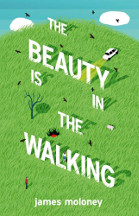The beauty is in the walking by James Moloney

Angus and Robertson, 2015. ISBN 9780732299941
(Age:14+) Recommended. Jacob O'Leary has Cerebral Palsy and apart
from suffering a great deal of physical pain, he struggles to walk
and often finds himself in undignified positions after falling or
having been knocked over. This novel is not about disability
however. C.P. is something which his loving, supportive family and
protective friends appear to simultaneously accommodate and ignore
as he involves himself completely in everyday life.
Living in the small town of Palmerston, enjoying the last days of
his final school year, Jacob socialises with his tight group and
looks forward to starting work in a local business. Jacob's most
difficult problem appears to be how he should make romantic advances
to his close friend Amy, however his life changes wildly when
animals are cruelly killed in a series of vicious and nonsensical
attacks.
Speculation abounds and eventually police arrest a young Moslem boy,
a son from one of the families who have recently been employed in
the town's meatworks, the mainstay of the local economy. Having
witnessed racist bullying of the boy previously and despite having
assisted him to escape a savage beating, Jacob's self-criticism,
based on a sense of impotence from being unable to physically oppose
the mob, compels him to try to prove the lad's innocence.
Jacob's good intentions are admirable and the author beautifully
captures the adolescent zeal and earnestness which prompt naive
actions which lead to horrible ignominy and tension.
The core issue within the narrative has a reasonably uncluttered
trajectory, however there is a great deal happening on different
levels which makes this a worthy read. Passages describing the
torment of mustering courage to express love and affection are
enough to break your heart, because whilst this boy fears rejection,
anyone who has ever lived knows how he feels. It would be
unforgivable to spoil the story with too much detail, however the
emotional pain suffered by Jacob far surpasses the significant
physical trauma he must endure as he investigates this case. Some of
the behaviours which cause such discomfort when depicted are
repellent because they are morally wrong. Others simply reflect
weaknesses in character and natural human feelings. I commend the
author for portraying individuals courageously, showing the grit and
flaws without being tempted to follow saccharine formula and
expectation.
Rob Welsh